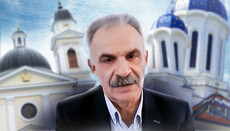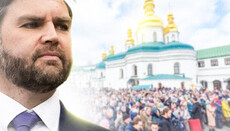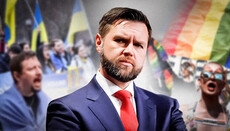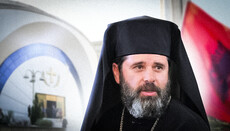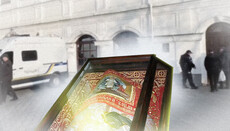Unia 2.0: The UGCC and OCU are on a direct way to "new unity"
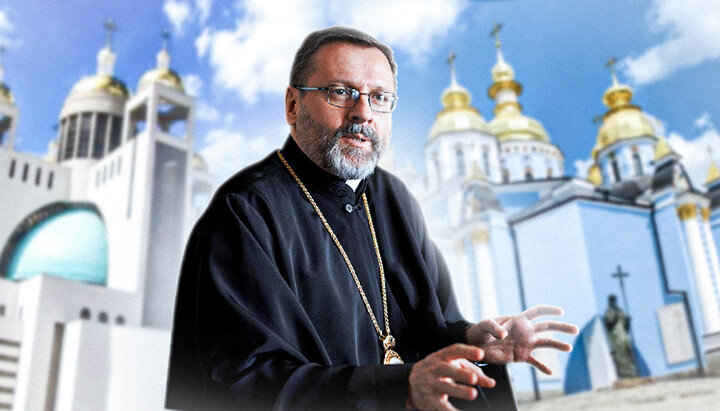
Shevchuk’s taken to rewriting Ukraine's history, claiming the Catholic Church has always sought to unite the nation. Why is he saying this and what’s actually happening?
The head of the UGCC Sviatoslav Shevchuk has been saying for several days in a row in his addresses to his flock things that allow us to conclude that the process of creating a new union between Catholics and Orthodox is nearing its logical conclusion. If you summarise everything that Shevchuk said in the first, second and third videos, his position looks like this
- Metropolitan Isidore of Kiev, who betrayed Orthodoxy at the Council of Florence and ended his life as a Catholic cardinal, is for Shevchuk the man who did everything to "unite the Church of Kiev with the Ecumenical Patriarchate and the Church of the Latin Rite".
- The Brest Unia is not a political project of the Pope and Rzeczpospolita to catholicize the Orthodox but a "historical achievement of unity”.
- The restoration of the Orthodox hierarchy, destroyed by Catholics, in Kiev in 1620 by Patriarch Theophanes of Jerusalem is "the creation of a parallel hierarchy", which was a "special wound and split of the Church of Kiev".
- Peter Mohyla, in Shevchuk's new version of history, turns out “to have dreamt of uniting with Rome in the Kiev Patriarchate".
Shevchuk concludes that Ukraine's Christians must move toward full apparent "unity," and the territory of our country will be the space in which this "unity" is realized.
It turns out that the union is a good thing for Ukraine, while faithfulness to Orthodoxy is an evil and a "wound" on the body of the Ukrainian people. To understand the falsity of such a position, and more importantly, why Shevchuk says such things, one must at least briefly analyze each of his theses.
Metropolitan Isidore: "unifier" or traitor?
Metropolitan Isidorу of Kiev and All Rus', the Apostolic Locum Tenens of the Holy Patriarch of Antioch, was one of the most active supporters of the union with the Catholics at the Council of Florence.
He, like many Greek bishops (Isidore was born in Monemvasia, Greece) hoped that if the Orthodox recognized the primacy of Pope Eugene and signed a union with Rome, the Byzantine state would receive military aid from Europe against the Turks. His signature on the agreement with the Vatican comes immediately after that of the autocrat of the Romans, John Palaeologus, and two representatives of the Patriarchate of Antioch.
However, the Unia was not accepted by common people and the clergy, and all "unifying" ideas turned to ashes. On 6 September 1440, Metropolitan Isidore left Florence, and in a fortnight he was appointed papal legate to Poland, Lithuania and Livonia. On December 18, he became a Catholic cardinal. On 19 March 1441, he arrived in Moscow, where the residence of the Metropolitan of Kiev (Isidore was never in Kiev itself) was situated.
In Moscow, Isidore handed over to Grand Duke Vasili a message from Pope Eugene with a request to help the cardinal in uniting the Russian Church and Rome.
During the archbishop's service at the Assumption Cathedral, Isidore commemorated the Pope and read from the ambo the decrees of the Florentine "Council". Three days later the cardinal was taken into custody and imprisoned in the Chudov Monastery. At a Council of Russian Clergy, Isidore declared that he would not renounce the Unia. Later, probably with Vasili's knowledge, he fled. Isidore died in Rome and was buried in St. Peter's Basilica in the Vatican. His activities were amongst others the occasion for the de facto proclamation of autocephaly by the Russian Church.
Of course, the UGCC can call him anything they like, but we can see that the story of Metropolitan/Cardinal Isidorу is the typical fate of a traitor.
The Brest Unia – good or evil?
In 1596, several bishops of the Kiev Metropolis, led by Michael Rogoza, decided to join the union (Unia) with Rome. For Shevchuk, this decision is unequivocally "good," because it contributed to the "unification" of the Ukrainian people. But is it so?
The Unia is a religious and political project for the forcible Catholicisation of the Ukrainian people. By and large, it is a critical moment in the history of the Orthodox Church on this territory, because it was the Unia that initiated the process that eventually led to the fragmentation and division of the Ukrainian Orthodox Church.
One of the key reasons for the Catholicisation of Ukraine was the desire of the Polish nobility and the Catholic Church to extend their control over the territory of our country. The Polish nobility saw the Catholic Church as a useful tool in their efforts to control the Ukrainian population and promoted Catholicism as the dominant religion in the region by fire and sword.
Rome, for its part, saw Ukraine as a tool to extend its influence in Eastern Europe and the Russian state.
Moreover, it was the Polish Catholicisation of Ukraine that was almost the main factor in the eradication of the Ukrainian identity. With the coming of the Unia, everything Ukrainian was called "villain". Since that time, to be Orthodox meant to be alien to the "high" Catholic culture, etc. As a result, many of the traditions of our people and the cultural and Orthodox background, in which they were brought up, were destroyed.
Thus, the Catholicisation of Ukraine was a critical moment in the history of the Orthodox Church and our people, as it initiated a process that ultimately led to the fragmentation and division of Ukraine. That is why all of Shevchuk's tales of some "good" for our people look extremely strange and cause nothing but amazement.
It is enough to recall the words of the great Kobzar Taras Shevchenko that "Сatholic priests came and set fire to our quiet paradise, and poured out a wide sea of tears and blood" to understand how far from the truth Cardinal Shevchuk's words are.
Patriarch Theophanes and the restoration of the hierarchy in Ukraine
Another extremely controversial thesis of Shevchuk says that the restoration of the Orthodox hierarchy destroyed by Catholics by Patriarch Theophanes of Jerusalem in 1620 is "the creation of a parallel hierarchy" and "a special wound and split of the Church of Kiev".
We will not go into the canonical details of Shevchuk's completely absurd statement about the "parallel hierarchy" but simply ask: did the faithful people of Ukraine really not want to be Orthodox and perceive the Catholic clergy in Ukraine as a guarantee of national "unity"? No, they did not.
For example, Mykhailo Hrushevsky writes that a delegation of the Cossacks went to the capital of the Grand Duchy of Moscow in 1620 to negotiate with Patriarch Theophanes of Jerusalem (where he was then) for the deployment of Orthodox bishops and priests in Ukraine, almost completely destroyed by the Catholics.
Another researcher, Pole M. Drozdowski, claims that Hetman Sahaidachny provided Patriarch Theophanes with a Cossack army of 1500 men to protect him during his stay in Ukraine. According to Drozdowski, it was the support of the Cossack army that was one of the most important factors that allowed Patriarch Theophanes to restore the Orthodox hierarchy in the Polish-Lithuanian Commonwealth. The participation of the Cossacks in the mission of the Jerusalem hierarch prevented counter-radical measures by the government of Rzeczpospolita against Patriarch Theophanes and the newly appointed hierarchy.
As can be seen, the Ukrainian people and the Ukrainian government, represented by Hetman Sahaidachny advocated the restoration of Orthodoxy in the region. In fact, the activities of Patriarch Theophanes contributed to solving the problem of interfaith relations in a multi-ethnic and multi-confessional state, such as the Polish-Lithuanian Commonwealth. In other words, the achievement of at least visible unity of the Ukrainian people was the result of the efforts of the Patriarch of Jerusalem. The legalisation of the Orthodox hierarchy by King Vladislav IV in 1633 testifies to it. Vladislav IV, in fact, continued the work of Patriarch Theophanes in the new conditions at the legislative level.
Thus, the Orthodox Church sought precisely to end the terrible confrontation within the Ukrainian people instigated by Catholics and not vice versa, as Shevchuk says.
Peter Mohyla and Catholicism
One must have a rich imagination to call St. Peter Mohyla a supporter of the Unia. Claims that he dreamt of the union with Rome are not only unsupported by historical evidence, but are also untrue.
For example, in a letter to King Wladyslaw IV of Poland, the saint wrote: "We do not wish to be under the jurisdiction of the Pope or of any other king, but only under the jurisdiction of Christ".
There is also a great deal of information that the saint actively opposed the attempts of Rome to convert the Orthodox Christians in Ukraine to Catholicism. According to historical accounts, he was known for his fierce defence of the Orthodox faith and efforts to protect the rights of Orthodox Christians. Therefore, claims that he was a supporter of the unification with the Catholic Church are nothing more than an attempt to rewrite history in one’s own interests.
Who in Ukraine is thinking of the "unity" of Catholics and Orthodox?
Only Shevchuk's last thesis can be agreed to some extent. Indeed, there are Orthodox Christians (the OCU) in Ukraine who are pondering how they can move towards full visible "unity" with Catholics.
Both Shevchuk and other UGCC hierarchs have repeatedly stated that the territory of our country will be the space for the "unity" of the Orthodox and Catholics to take place. Also, some Orthodox hierarchs and religious experts have expressed the opinion that the OCU was created as a "platform" for the approbation of a new union between the Phanar and Rome. And the recent statements of Shevchuk clearly show that the process of the unification of the OCU and the UGCC is in full swing.
Perhaps, for this reason, during his visit to Rome, Epifaniy Dumenko had a separate meeting with Cardinal Kurt Koch, who directly deals with the issues of unity between Catholics and Orthodox Christians.
This probably explains why the OCU has energetically taken up a calendar reform that allows for the elimination of differences with Catholics in the celebration of the main Christian dates. Furthermore, we have repeatedly seen the OCU hold joint "services" with the Uniates. While this is not yet a liturgy, one can't but see movement in this direction.
There are several factors which indicate that the OCU is an ideal partner for unification with Catholics.
First, the OCU is geographically located in the heart of Eastern Europe, which allows it to serve as a bridge between the Catholic and Orthodox Churches. As before, the Catholicisation of Ukraine can also be seen as a starting point for the further advance of Catholicism to the East.
Secondly, within the OCU, merging with Catholics does not cause any internal protest.
Thirdly, in the conditions of war such "formalities" as dogmatic and doctrinal differences between Catholics and Orthodox can quite easily be replaced by "political expediency" and the desire to "unite" the Ukrainian people.
Incidentally, the destruction of the UOC fits precisely into this framework since it makes it possible to eliminate the Church that opposes the levelling of the Orthodox doctrine. In fact, the Catholic nobles in the 16th and 17th centuries followed the same pattern.
In other words, Shevchuk's latest speeches tell us that the processes of merging Catholics and Orthodox are in full swing and that the Uniates want to take a leading role in these processes. Shevchuk is simply preparing the ideological basis for the future union and is doing everything to make his UGCC look like a "unifier" of the Ukrainian people rather than a structure that will destroy Orthodoxy here.
